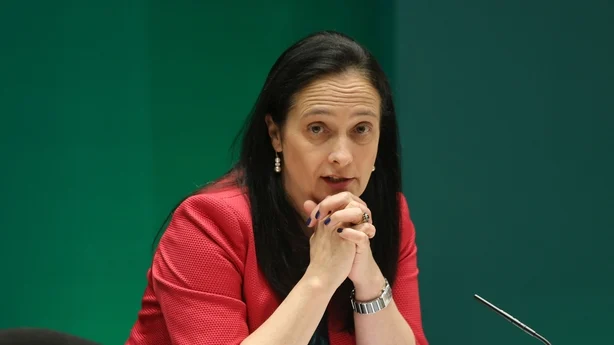Dec 24, 2024
Dec 14,2024
Opinion: The Minister for Arts has lost her seat in the General Election, but she leaves a formidable legacy, writes Journal Of Music editor Toner Quinn.
When Catherine Martin was appointed Minister for Media, Tourism, Arts, Culture, Sport and the Gaeltacht in June 2020, three months into the pandemic, those working in music and the arts had become accustomed to low expectations.
Over the previous decade, the Arts Council budget had swung down to €57m after the economic crash, and, by 2020, it still had not come back to even its 2007 figure. The music scene was heating up again, but life was still challenging for artists. There always seemed to be enough to pay administrators and advisers, but rarely enough for the people who walked out on stage.
In February of that year, the Arts Council had launched its Paying the Artist policy. It stated that 'underpaid or unpaid contributions of artists represent a hidden subsidy to the cultural life of Ireland … this is unfair and unsustainable.' Yet few imagined substantial change happening.
The next Minister for Arts, and indeed every such appointment over the coming years, will be compared to her, and she has left a formidable legacy.
When the pandemic struck, therefore, it seemed it would be almost a final blow. Incomes vanished. Careers collapsed. The resilience of artists was remarkable, but memories of the 2008 crash were real and we could anticipate the future ahead. When I wrote in the Journal of Music, in the summer of 2020, that the new Minister ‘has got to break away from … old thinking’ and ‘set out a new vision for arts and culture in Ireland’, it was more in desperation rather than hope.
But we could immediately see a shift. She set up a taskforce for the arts and started making funding announcements. In July, she allocated an additional €30m for the Arts Council (even though the outgoing government had already given an emergency €25m) and then, in the budget that autumn, just six months after her appointment, she announced €130m for the Council for the following year, a 63% increase on the 2020 figure, plus an additional €50m for the live entertainment sector. The news amazed and relieved the arts community, even if they felt it was long overdue.

But it didn’t stop there. That November, the arts taskforce recommended a Basic Income for the Arts (BIA) and Minister Martin was fully behind it. With the Greens, she had already negotiated a Basic Income pilot for the general public into the Programme for Government, and, after the pandemic hit, she clearly saw the opportunity to trial the scheme within the arts scene. She secured government support in October 2021 and the Basic Income for the Arts would begin the following year.
Nine thousand people applied for that scheme and two thousand were randomly selected for the pilot. The weekly payment of €325 began in October 2022. After six months, research showed that participants had a 10% decrease in depression and anxiety. After twelve months, they reported improved life satisfaction and were more productive generally. All of the main political parties have now said in their election manifestos that they will continue with the scheme after the pilot ends next August. The BIA could have a transformative impact on the arts, and if rolled out to the general public, on society as a whole. Catherine Martin has made the impossible possible.
Arts Council funding now sits at €140m for 2025, a 75% increase on where it was before she was appointed. It is a figure that no one in the arts could have imagined, and when you combine it with the BIA, one wonders how different things might have been during the pandemic and after if she had not been in government.
Today I represented the Green Party at the National Campaign for the Arts General Election Hustings in the Gate Theatre Dublin.
— Catherine Martin (@cathmartingreen) November 18, 2024
It was great to see support from all parties present to continue the Basic Income for the Arts which I fought so hard to introduce. pic.twitter.com/O1Vals4wOm
There were many more announcements made by Catherine Martin, and not all went without criticism, but she swept aside all of the old excuses for not supporting the arts, gave the music and arts community the sense that for the first time in many years they were appreciated and listened to, and she has given them the confidence to aim higher in the future. As a musician herself, she understood the deep role artists and culture play in Irish society and the riches we reap when we support them.
In return for being the most consequential Minister for Arts since Michael D. Higgins, however, she not only lost her seat and her place in government but almost her entire party lost their seats too. It is a case of powerful business interests and their PR companies having influence over the media, creating an overly negative narrative around the Greens – right in the middle of a climate crisis – and ignoring the transformative BIA.
But despite all of this, Catherine Martin achieved something else. The next Minister for Arts, and indeed every such appointment over the coming years, will be compared to her, and she has left a formidable legacy. We knew in the arts we were living through extraordinary times during her tenure. Now the artistic community needs to hold on to that same ambition – and build for the future.
Read more from the Journal Of Music here.